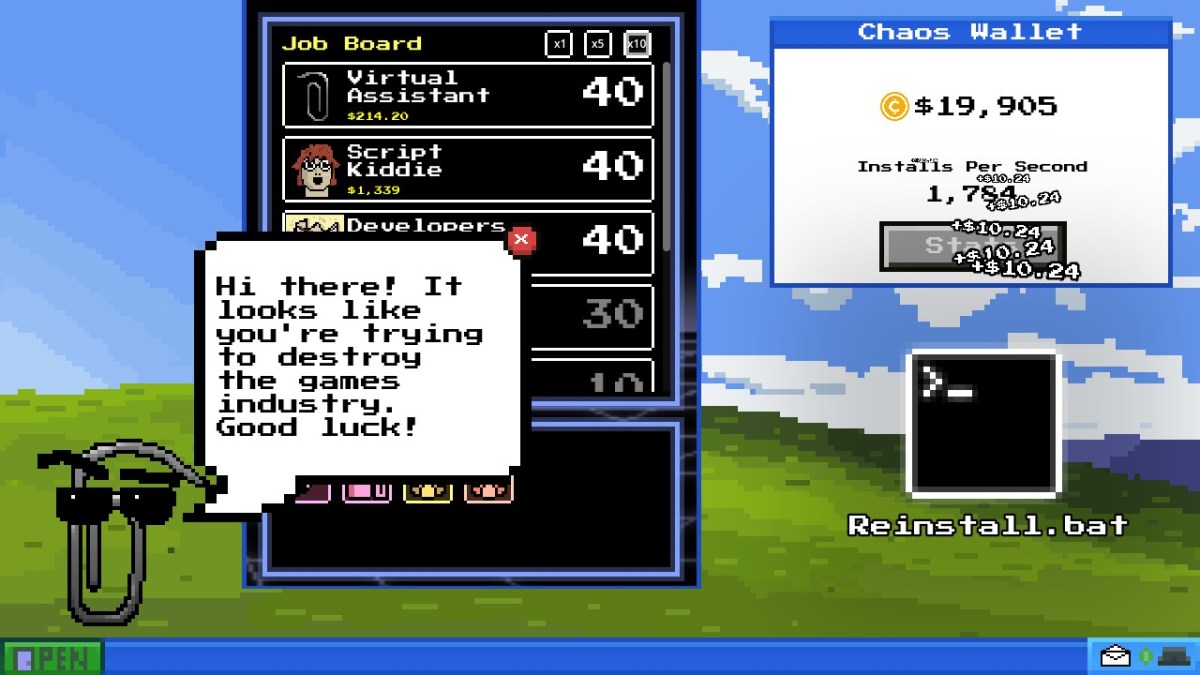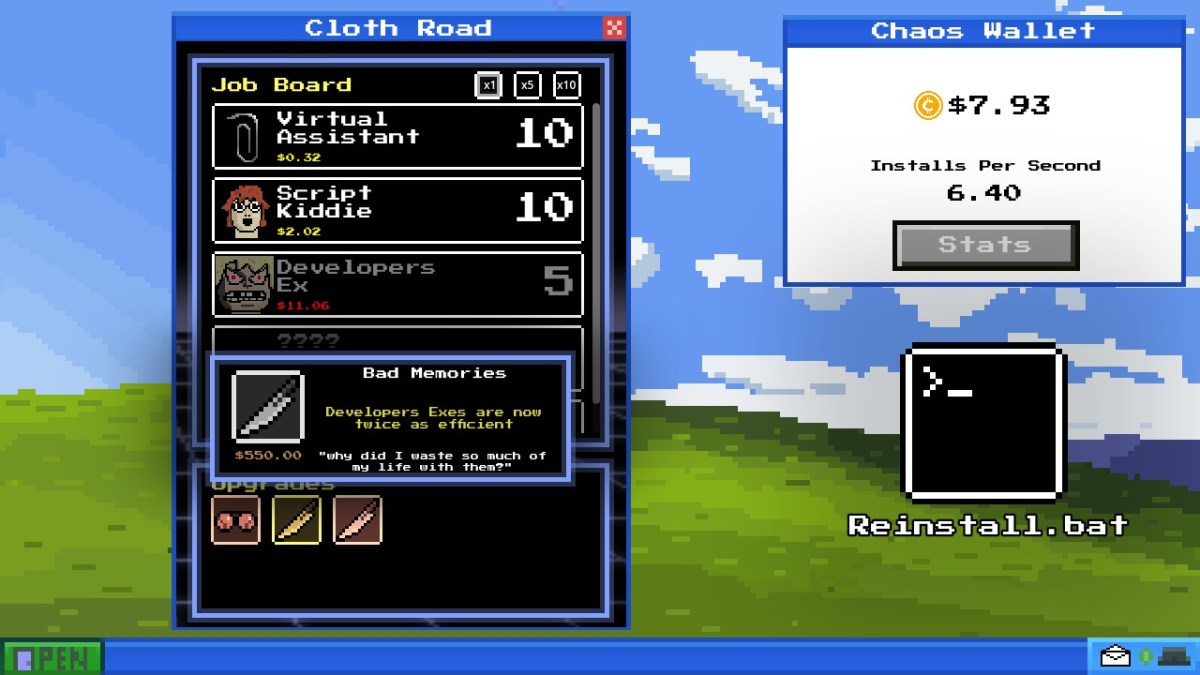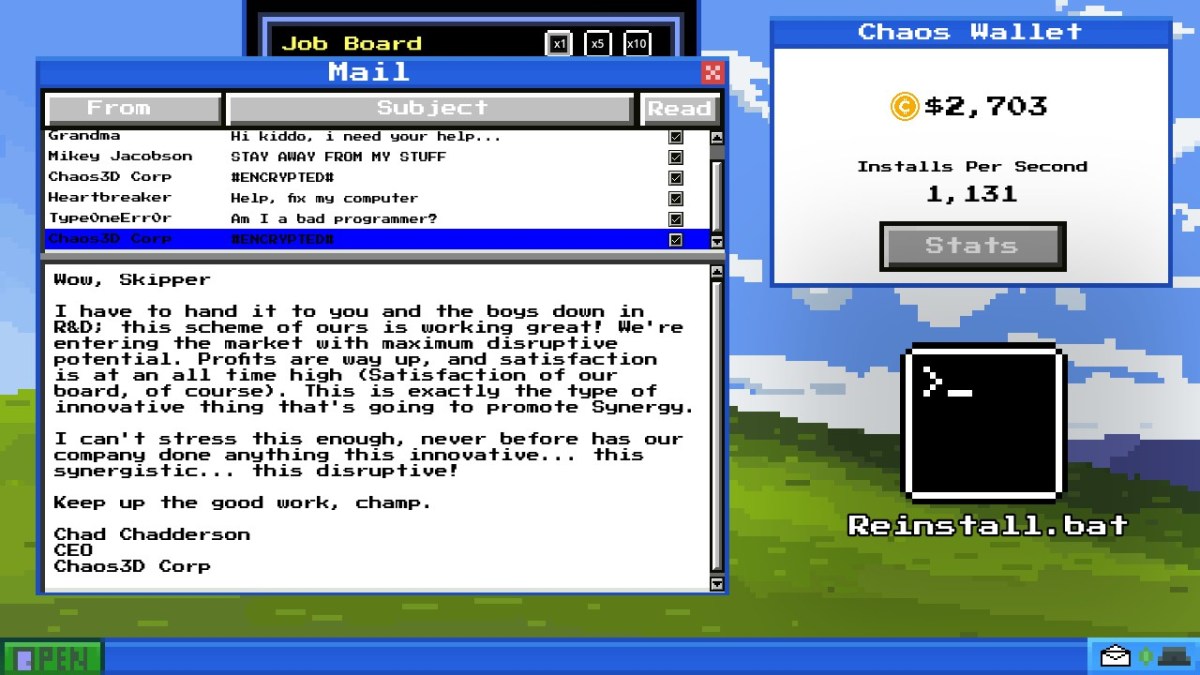Last month, Unity shot itself in the foot by announcing a policy change, since revoked, that could’ve charged game developers a “Runtime Fee” for every time their game was installed on an end user’s system. Critics of the move pointed out that the Runtime Fee could’ve been effectively weaponized to drive small studios out of business. In Install Fee Tycoon, you’re trying to do just that, and I talked with the indie dev team behind the game about mocking the controversy.
IFT is a new idle clicker parody from Canadian indie developers John Warner and Trevor Da Silva, who previously collaborated on last year’s Soulslike parody The Last Hero of Nostalgaia. Nostalgaia was a Unity project, as were Warner’s previous games The Fall and The Fall, Part 2.
Related: Unity Closes Offices Following Death Threats

In Install Fee Tycoon, you’re an anonymous computer nerd with a vast library of pirated games. As a result, you’re hired off the books by engine marketers “Chaos3D” to rapidly un- and reinstall random games on your system, in order to run up Chaos3D’s profits. Each click earns you cash, which you can reinvest in scripts, chatbots, and dodgy AI to farm clicks on your behalf. Before long, you’re building a dark empire of runtime money off the back of indie developers, while boosting your team’s productivity with upgrades, puzzles, and cryptojacking your grandmother.
IFT’s got a cynical tone, but it’s not meant to be angry. “We had a lot of fun and we laugh at it, but I don’t feel legitimately hostile,” Warner told me via Discord. “I think if I’d felt legitimately hostile, I’d probably just be rage-posting on Twitter.”
Warner and Da Silva started Install Fee Tycoon as a quick project – Warner calls it a “meme game” – to teach themselves how to work with the Godot engine. Three weeks later, they released it on Steam for the lowest price possible, $0.99, after Valve told them they couldn’t sell a game for $0.20.
“John and I put together the majority of the gameplay within the first week,” Da Silva told me via Discord. “Steam forces two weeks of ‘coming soon,’ so after that, we shoved in as much as we possibly could. We extended everything; more minigames, dialogue, references.”
Related: Best Assassin’s Creed Games, Ranked

I spoke to Da Silva and Warner on the same week that Unity announced its CEO, John Ritticello, stepped down. IFT directs a lot of its sharper jabs at Unity the company, so I asked what their stance was on continued development in Unity.
“There’s two sides to this,” Da Silva said. “There’s some indies, like me personally, who feel that nothing can really be done. The trust has been lost. Even with John Ritticello gone. I’ve been using Unity for 12 years now, and making IFT proved to me that I can learn another engine really quickly. I’m really loving [Godot]. I think for people like me, the trust is gone and there’s not much that can be done.”

“I have a much more forgiving attitude than that,” Warner said. “…I think it’s pretty obvious to Unity that they made a mistake. I still think it’s a remarkable piece of software. I’m not excited about leaving Unity; I’ve got a lot of tech built in Unity. I would like to keep going with them.”
Warner continued, “At this point, I feel like the real issue here is the violation of trust. It’s not developers like us, it’s people like [Hinterland Games, creators of] The Long Dark here in Vancouver. I don’t know how much money those guys are making, but I assume that they’re making a fair bit, and you really came knocking on their door one day and said ‘Hey, I know that we had an agreement, but we’re changing the deal. We want some of your money.’ That is insane. I’m not sure how they’re gonna build back that trust.”
